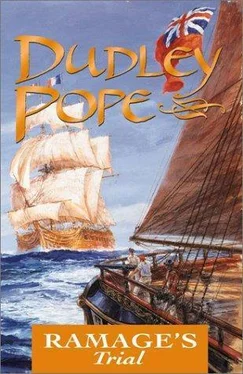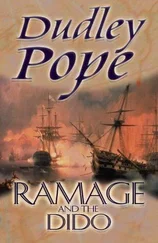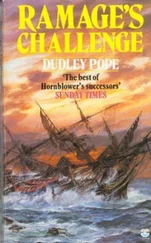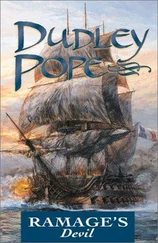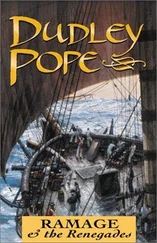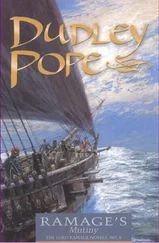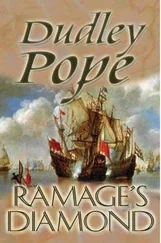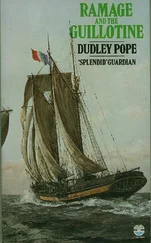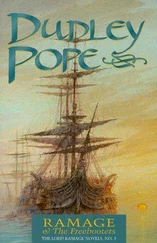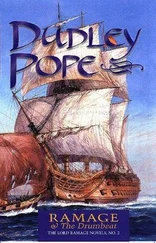Dudley Pope - Ramage's Trial
Здесь есть возможность читать онлайн «Dudley Pope - Ramage's Trial» весь текст электронной книги совершенно бесплатно (целиком полную версию без сокращений). В некоторых случаях можно слушать аудио, скачать через торрент в формате fb2 и присутствует краткое содержание. Жанр: Исторические приключения, Морские приключения, на английском языке. Описание произведения, (предисловие) а так же отзывы посетителей доступны на портале библиотеки ЛибКат.
- Название:Ramage's Trial
- Автор:
- Жанр:
- Год:неизвестен
- ISBN:нет данных
- Рейтинг книги:5 / 5. Голосов: 1
-
Избранное:Добавить в избранное
- Отзывы:
-
Ваша оценка:
- 100
- 1
- 2
- 3
- 4
- 5
Ramage's Trial: краткое содержание, описание и аннотация
Предлагаем к чтению аннотацию, описание, краткое содержание или предисловие (зависит от того, что написал сам автор книги «Ramage's Trial»). Если вы не нашли необходимую информацию о книге — напишите в комментариях, мы постараемся отыскать её.
Ramage's Trial — читать онлайн бесплатно полную книгу (весь текст) целиком
Ниже представлен текст книги, разбитый по страницам. Система сохранения места последней прочитанной страницы, позволяет с удобством читать онлайн бесплатно книгу «Ramage's Trial», без необходимости каждый раз заново искать на чём Вы остановились. Поставьте закладку, и сможете в любой момент перейти на страницу, на которой закончили чтение.
Интервал:
Закладка:
And Tewtin was right: it would be six months or more before the Admiralty could reprimand him for delaying the Calypso, and only a fool would think that the Admiralty valued the frigate's speedy arrival in England more than the safe arrival of a large trade convoy.
The Count was safe, which was what mattered as far as the Prince of Wales was concerned, and would be coming home in the convoy. In addition, Ramage reflected, from Tewtin's point of view there was a good chance of the convoy arriving unscathed if Ramage commanded it: all too often convoys were commanded by frigate captains who were fit for nothing else or had fallen out of favour with the admiral. It was not too difficult to fall out of favour with some admirals - when sent to "cruise", a euphemism for hunting for prizes, it was no good coming back too often with stories of bad luck. The admiral's share in a prize was an eighth of its value; a couple of years on a good station usually meant he could buy a large country estate and put enough in the Funds to run it, apart from buying a knighthood or baronetcy and, with luck, having a seat in Parliament, being in effect issued one of those like Rochester which, with several others, the Admiralty regarded as its own property . . . Admiral Sir Hyde Parker was thought to have made £200,000 in prize money during his recent four years as commander-in-chief at Jamaica, generally reckoned the most lucrative station of all. So no doubt Tewtin had high hopes, and those hopes rested almost entirely on his frigate captains. That in turn depended on having frigates. No commander-in-chief ever had enough of them, so Tewtin was very lucky to have three arrive unexpectedly out of the south, a bonus he could use for the convoy without losing any of his own yet two of which he could fill with his own people. Each of the two prizes now needed a captain and three lieutenants, apart from warrant and petty officers. The commander-in-chief of the station made all such promotions, although they had to be approved afterwards by the Admiralty.
Watched by Tewtin, Ramage picked up the Admiralty orders and read them through once more. They had been drafted in good faith and neither Their Lordships nor Nepean could have anticipated the present situation. Tewtin could not interfere with a ship acting under direct Admiralty orders, but he was too cunning for that. The Admiralty had ordered the Calypso back to England, but they had not added a phrase like "with all possible despatch", or "without delay". This, Ramage noted bitterly, allowed Tewtin to claim that since the Calypso was returning to England anyway, she might as well take the convoy under her protection.
There was just one more card to play, a poor and miserable card but the only one he had left.
"To be perfectly honest, sir, I'm worried about the Count of Rennes. He is in a desperate hurry to get back to England, to see the Prince of Wales - and of course he has large estates in Kent. I had been wondering whether or not I should keep him on board the Calypso and make a dash for it."
Tewtin nodded understandingly. "I see your problem, but I hope the Count is grateful to you - and the Royal Navy - for rescuing him. Now is not the time to show impatience - why, but for you he would be rotting on Devil's Island. From what I hear, the prisoners don't last very long down there. If your Count of Rennes makes a fuss," he said portentously, "I'll have a word with him. In the meantime, transfer him to that merchant ship - what's she called? - where he has a suite awaiting him
At that point Ramage knew he was beaten: at the end of a week in Barbados, he was going to have to command a convoy back to England, and all he could do now was hope that the merchant ships were not too undermanned, that their sails were not so ripe they were furled in anything of a breeze, that their spars were not so sun-dried and shaken that they would forever be signalling to one of the escort that they needed assistance - which meant sending across a carpenter and his mates to fish a spar.
All of which meant that all too many shipowners sent their ships to the West Indies with too few men and ancient sails, with rigging and cordage that should have been replaced a year ago, spars and yards that had shakes in them wide and deep enough to trap a man's finger, if not a whole hand - and always relying on the Royal Navy in an emergency to help them. And usually the Royal Navy had no choice: a disabled ship left behind by the convoy could be a ship lost to French privateers, and there would be violent letters of protest arriving at the Admiralty from the outraged owners and the insurance underwriters, and woe betide the poor frigate captain who was exasperated beyond control by these constant demands on his men and resources. Not for nothing did most commanders of convoys and the escorts refer to the masters of merchant ships as "mules".
When would the Admiralty in its collective wisdom put its collective foot down and stop these profiteering shipowners from running their ships at the taxpayers' expense? With very few exceptions, shipowners were making their fortunes, thanks to the war. To begin with, the convoy system stopped any rush for a ship to be among the first dozen or so to arrive in England with the new harvest of sugar, tobacco, nutmeg or whatever it was to reap a high price in the market place. The convoy system meant all the ships arrived at once, their cargoes swamping the market, which was bad luck for the shippers (the planters in the West Indies, in this case) but fine for the shipowners. In peacetime, the faster ships (well kept and well commanded) could reasonably charge the highest freight because the planters, first at the market with their produce, made a good profit. In wartime there was no need for fast ships, and unscrupulous shipowners were quick to buy up any hull that would swim and could be insured: the convoy system ensured that she would not be beaten into port by faster ships and the Royal Navy was forced (blackmailed, in fact) to keep her afloat. And, to save any strain and wear on sails, spars, masts and cordage (costs, in other words), the damned mules always reefed at night, no matter how scant the breeze.
In turn that meant that each could sail with a smaller crew: with no risk of having to reef in a squall, many of these smaller traders sailed with only a master, mate, a couple of apprentices (whose indentures meant they were paying to be on board) and half a dozen men. Food, from what Ramage heard, was bad, and any complaints by the crew to a master met with a standard response: a man or two could easily be handed over to the next pressgang that came in sight. The choice was simple: serve in a merchant ship with bad food but higher pay, signing on for a single round-trip voyage, or be swept into one of the King's ships, serving until the next peace, which at the moment seemed a lifetime away.
When he returned to the Calypso and stepped through the entryport, Aitken met him with a broad grin on his face. "Mr Southwick wanted to talk to you before you go below, sir," he said, "and I've passed the word for him."
"What's all this about?" Ramage asked impatiently: he had been sitting in his cutter so long that the heat now soaking him with perspiration seemed to come from inside his body, as though it was a glowing coal. At that moment Southwick, also grinning, bustled up.
"You have visitors, sir, and I took the liberty of taking them down to wait in the cabin, where it's cooler."
Why was Southwick so concerned about visitors? Why the grin? Why the "I've got a surprise for you" way he was rubbing his hands like a parson with the Easter offering? Ramage, still at the entryport, looked outboard along the boat boom, rigged out at right-angles to the ship's side and to which the painters of boats were secured. Only the Calypso's cutter was now secured there, so how had the visitors arrived? Had they dropped from a passing cloud? And who wanted visitors at this moment: he was still so angry over Tewtin's behaviour that he just wanted to go down to his cabin and brood in peace and quiet. Sulk, really, because Tewtin had trapped him with an Admiralty order, and the prospect of driving a convoy of a hundred mules back to England at an average speed (if he was lucky and found the right winds and persuaded the mules to keep enough canvas set) of perhaps four knots. Days and weeks must pass before he could discover anything about Sarah.
Читать дальшеИнтервал:
Закладка:
Похожие книги на «Ramage's Trial»
Представляем Вашему вниманию похожие книги на «Ramage's Trial» списком для выбора. Мы отобрали схожую по названию и смыслу литературу в надежде предоставить читателям больше вариантов отыскать новые, интересные, ещё непрочитанные произведения.
Обсуждение, отзывы о книге «Ramage's Trial» и просто собственные мнения читателей. Оставьте ваши комментарии, напишите, что Вы думаете о произведении, его смысле или главных героях. Укажите что конкретно понравилось, а что нет, и почему Вы так считаете.
